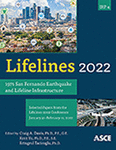Resilience of Water Distribution Network: Enhanced Recovery Assisted by Artificial Intelligence (AI) Considering Dynamic Water Demand Change
Publication: Lifelines 2022
ABSTRACT
Water distribution networks (WDNs) are critical infrastructure that provides essential support for the community life. Its service can be interrupted by natural hazards such as earthquakes. The resilience of a WDN is related to its capability to resistant damages as well as its speed to recover the service function. This paper introduces the development of a machine learning (ML) model to ensure fast restoration of WDN subjected to earthquake damages, and therefore improves the system resilience. The reinforcement learning (RL) model is trained to optimize WDN restoration sequence considering consumer needs and evolving water demands. The results show that compared with the repair sequence by the commonly used method of static importance ranking, repair sequence by RL model substantially improved the recovery speed of WDN. Besides, under different damage scenarios, the repair sequence by the RL agent consistently achieved efficient recovery (and therefore enhanced resilience), demonstrating the robustness of the RL model. This study demonstrates the potentials of artificial intelligence (AI) techniques to support optimal decision in managing the WDN under emergency conditions.
Get full access to this article
View all available purchase options and get full access to this chapter.
REFERENCES
Alliance, A. (2001). Seismic fragility formulations for water systems, Part I-Guideline.
Applegate, C. J. (2018). New framework for probabilistic interdependency modeling and critical component identification to increase infrastructure system resilience, Georgia Institute of Technology.
Cimellaro, G. P., A. Tinebra, C. Renschler, and M. Fragiadakis. (2016). “New Resilience Index for Urban Water Distribution Networks.” Journal of Structural Engineering 142(8).
Didier, M., S. Baumberger, R. Tobler, S. Esposito, S. Ghosh, and B. Stojadinovic. (2018). “Seismic resilience of water distribution and cellular communication systems after the 2015 Gorkha earthquake.” Journal of Structural Engineering 144(6): 04018043.
Eidinger, J., and A. Tang. (2014). Christchurch, New Zealand Earthquake Sequence of M 7.1 September 04, 2010 M 9.3 February 22, 2011 M6. 0 June 13, 2011: Lifeline Performance, American Society of Civil Engineers Reston, VA.
Goodfellow, I., Y. Bengio, A. Courville, and Y. Bengio. (2016). Deep learning, MIT press Cambridge.
Hernadez, E., S. Hoagland, and L. Ormsbee. (2016). Water distribution database for research applications. World Environmental and Water Resources Congress 2016.
Hossain, N. U. I., F. Nur, S. Hosseini, R. Jaradat, M. Marufuzzaman, and S. M. Puryear. (2019). “A Bayesian network based approach for modeling and assessing resilience: A case study of a full service deep water port.” Reliability Engineering & System Safety 189: 378-396.
Hosseini, S., K. Barker, and J. E. Ramirez-Marquez. (2016). “A review of definitions and measures of system resilience.” Reliability Engineering & System Safety 145: 47-61.
Karakoc, D. B., Y. Almoghathawi, K. Barker, A. D. González, and S. Mohebbi. (2019). “Community resilience-driven restoration model for interdependent infrastructure networks.” International Journal of Disaster Risk Reduction 38: 101228.
Klise, K. A., R. Murray, and T. Haxton. (2018). An Overview Of The Water Network Tool For Resilience (Wntr), Sandia National Lab.(SNL-NM), Albuquerque, NM (United States).
LeCun, Y., L. Bottou, Y. Bengio, and P. Haffner. (1998). “Gradient-based learning applied to document recognition.” Proceedings of the IEEE 86(11): 2278-2324.
Liu, W., and Z. Song. (2020). “Review of studies on the resilience of urban critical infrastructure networks.” Reliability Engineering & System Safety 193: 106617.
Liu, W., Z. Song, M. Ouyang, and J. Li. (2020). “Recovery-based seismic resilience enhancement strategies of water distribution networks.” Reliability Engineering & System Safety 203.
Mazumder, R. K., X. Fan, A. M. Salman, Y. Li, and X. Yu. (2020). “Framework for seismic damage and renewal cost analysis of buried water pipelines.” Journal of Pipeline Systems Engineering and Practice 11(4): 04020038.
Mnih, V., K. Kavukcuoglu, D. Silver, A. A. Rusu, J. Veness, M. G. Bellemare, A. Graves, M. Riedmiller, A. K. Fidjeland, and G. Ostrovski. (2015). “Human-level control through deep reinforcement learning.” Nature 518(7540): 529-533.
Nair, G. S., S. R. Dash, and G. Mondal. (2018). “Review of Pipeline Performance during Earthquakes since 1906.” Journ. Performance of Constructed Facilities 32(6): 04018083.
O’Rourke, T. D., S.-S. Jeon, S. Toprak, M. Cubrinovski, M. Hughes, S. van Ballegooy, and D. Bouziou. (2014). “Earthquake response of underground pipeline networks in Christchurch, NZ.” Earthquake Spectra 30(1): 183-204.
Paszke, A., S. Gross, F. Massa, A. Lerer, J. Bradbury, G. Chanan, T. Killeen, Z. Lin, N. Gimelshein, and L. Antiga. (2019). Pytorch: An imperative style, high-performance deep learning library. Advances in neural information processing systems.
Pudasaini, B., and S. Shahandashti. (2018). “Identification of Critical Pipes for Proactive Resource-Constrained Seismic Rehabilitation of Water Pipe Networks.” Journal of Infrastructure Systems 24(4): 04018024.
Shahata, K., and T. Zayed. (2016). “Integrated risk-assessment framework for municipal infrastructure.” Journal of Construction Engineering and Management 142(1): 04015052.
Wang, M., L. Yu, D. Zheng, Q. Gan, Y. Gai, Z. Ye, M. Li, J. Zhou, Q. Huang, and C. Ma. (2019). “Deep graph library: Towards efficient and scalable deep learning on graphs.” arXiv preprint arXiv:1909.01315.
Yu, Y., and C. Jin. (2008). Empirical peak ground velocity attenuation relations based on digital broadband records. The 14th world conference on earthquake engineering.
Zhang, W., and N. Wang. (2016). “Resilience-based risk mitigation for road networks.” Structural Safety 62: 57-65.
Information & Authors
Information
Published In
History
Published online: Nov 16, 2022
Authors
Metrics & Citations
Metrics
Citations
Download citation
If you have the appropriate software installed, you can download article citation data to the citation manager of your choice. Simply select your manager software from the list below and click Download.
